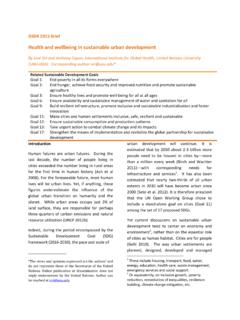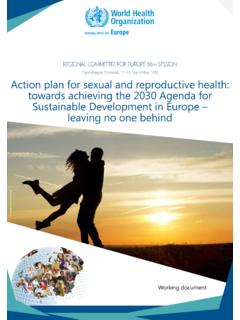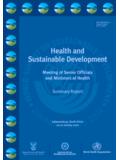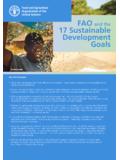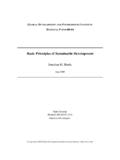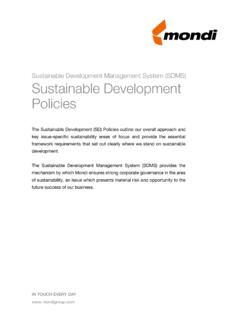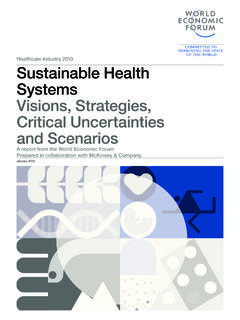Transcription of Health in the Context of Sustainable Development
1 WHO/HDE/ : EnglishDistr.: LimitedWorld Health OrganizationHealth in the Context of Sustainable DevelopmentBackground DocumentCopyright world Health organization 2002 This document is not issued to the general public, and all rights are reserved by the world HealthOrganization (WHO). The document may not be reviewed, abstracted, quoted, reproduced or translated, inpart or in whole, without the prior written permission of WHO. No part of this document may be stored in aretrieval system or transmitted in any form or by any means - electronic, mechanical or other - without theprior written permission of WHO. The views expressed in this document by named authors are solely the responsibility of those Health OrganizationHealth in the Context of Sustainable DevelopmentBackground DocumentPrepared by Y.
2 Von Schirnding and C. Mulhollandfor WHO Meeting: Making Health Central to Sustainable Development : Planning the Health Agenda for the world Summit on Sustainable Development Hosted by the Government of NorwayOslo, Norway29 November-1 December 2001 world Health OrganizationHealth in the Context of Sustainable Development |3 Table of Contents1| Introductionpage: and Context2| Conceptual Issues in Sustainable Developmentpage: and Population Health3| Key Health Trends: a Snapshotpage: of the Past Gaps and Future Health Transition4| Health and Povertypage: Poverty and Vulnerable of Poverty on and and Health Service Burden of Ill-health5| Globalization and Healthpage: Simple Model for Assessing Pathways Linking Globalization and Health6| Production and Consumption Processes, Natural Resource Use and Environmental degradationpage: Environmental Issues and Natural Resource Environment and Development Challenge of Linking Local to Global Brown Meets Green 7| Targeted Intervention Strategiespage: Diseases, Lifestyle Factors and Environmental Risks8| Building Stronger Health Systemspage: Functions of Health Elements for Building Health for Sustainable Development of the Health Personal Action to Improve Health9| Moving Beyond the Health Sectorpage: Planning10| Conclusionpage.
3 73|5| Preface This document has been prepared as a basis for discussion at the WHO meeting MakingHealth Central to Sustainable Development Planning the Health Agenda for the WorldSummit on Sustainable Development held in Oslo, Norway, from 29 November to 1 December 2001. It represents a point of departure, rather than a definitive account of allissues relevant to Health and Sustainable Development . There are many gaps to be filled, andissues still to be addressed. Thus, this document should be regarded as work-in-progress. The document draws, inter alia, on the work of several individuals who prepared workingpapers in advance of the meeting. In this regard, we would like to thank Eric Buch, RonLabonte, Tony McMichael, Gordon McGranahan, John Last and Devra Davis for their significant contributions.
4 For ease of readability, we have omitted references, tables and figuresfrom the document. However, these are available from WHO on request. As has been emphasised in the document, the concept of Sustainable Development is an elusive one, and its relationship with Health highly complex, variable and subject to a largenumber of interacting factors which influence the relationship. We are only now starting tocome to terms with this complexity, and to understand what the implications are for thehealth sector, and for those sectors outside of Health , in acting on this knowledge. There areno simple solutions for the myriad of problems we face and no single issue can be tackledsuccessfully by experts in a single field or a single sector of society.
5 How we reconcile economic Development with Health and Sustainable Development is a difficult balancing act, involving many trade-offs. What is the right mix of developmentchoices that balance long-term Health and well-being with short-term gains? What measuresand indicators should we be basing our Development choices on? What experiences do wehave to help us better align Development policies with Health objectives? What are some ofthe win-win strategies we can advocate for that address not only Health improvements,but also environmental improvements and contribute to economic Development ? What are the key diseases/conditions/risk factors, both present and future, that threaten Sustainable Development ? What are the most pressing and immediate Health problems to betackled and the interventions that may help lift the poor out of poverty?
6 What are the keyissues we need to be concerned about in relation to the process of globalisation? How do wemaximise the opportunities for Health , and minimise the threats? How do we address thehealth dimensions of the complexity of problems related to natural resource depletion, toenvironmental degradation, to unhealthy lifestyles and consumption processes? What arethe key issues and strategies needed to address these at the global level? At the country level?What have been the obstacles, and what can we learn from the wealth of experience wealready have? Health in the Context of Sustainable Development These are some of the issues we hope to tackle in the course of the Norway meeting, and wellbeyond. This will help us clarify what we want to emerge from a Health perspective on Sustainable Development .
7 We look forward to working together with our partners in furtherdeveloping the Health agenda for the world Summit on Sustainable Development . We sincerely thank the Norwegian Government for their generous financial support, and forhosting the meeting. Yasmin von SchirndingFocal Point: Agenda 21 6| Health in the Context of Sustainable Development 1| Background and ContextThe term Sustainable Development , as originally conceived by the 1987 world Commissionon Environment and Development (the Brundtland Commission ), was meant to entail Development that meets the needs of the present without compromising the ability of futuregenerations to meet their own needs . It was coined as part of an effort to bring environ-mental issues into the mainstream of Development , recognising that in order to address theescalating problems related to the environment, the root causes which lay in the broaderdevelopment process and the global economic system needed to be addressed.
8 As originally articulated, Sustainable captured the environmental issues (assumed to centreon the needs of futuregenerations), while Development captured the economic/povertyissues (assumed to centre on the needs of the presentgeneration). The concept has sincebeen broadened, in recognition of the non-environmental aspects of sustainability, and thenon-economic aspects of Development . Following the Brundtland Commission and its report Our Common Future , in 1992 the UN Conference on Environment and Development (UNCED) took place the largestgathering of heads of state ever held. This led to the Rio Declaration on Environment andDevelopment, Agenda 21 a global programme of action on Sustainable Development ,and to a number of specific global conventions.
9 Principle I of the Rio Declaration on Environment and Development states that Humanbeings are at the centre of concerns for Sustainable Development . They are entitled to ahealthy and productive life in harmony with nature . Chapter 6 of Agenda 21 takes this principle further, stressing the need to protect and promotehuman Health , with emphasis on meeting primary Health care needs, particularly in ruralareas; control of communicable diseases; protecting vulnerable groups; meeting the urbanhealth challenge, and reducing Health risks from environmental pollution and hazards. Thus, underlying the concept of Sustainable Development is the increasing recognition thatthe goals of Sustainable Development cannot be achieved when there is a high prevalence ofdebilitating illnesses (for example diseases of poverty), and the Health of the population cannotbe maintainedwithout ecologically Sustainable Development .
10 In this respect ecological hasboth social (as in social capital), as well as physical (as in natural capital) Development occurs in unsustainable ways, population Health gains may accompanyimproving economic conditions in the short term, but the Health gains might not be sus-tainable in the long term. Thus, time scales matter with Sustainable Development and in the Context of Sustainable Development |7 Social factors such as political instability, violent armed conflicts, discrimination, inequalitiesand inequities (within, and across, generations) are all inimical to Health , and to sustainabledevelopment. Health and Sustainable Development thus has an ethical or moral dimension,as well. This paper considers some of the complex interconnections between Health and sustainabledevelopment, and the challenges they present to policy makers.










